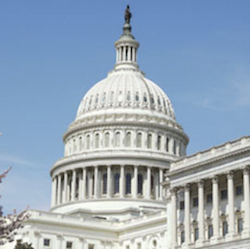
Four Republican senators who introduced a bill on Sept. 13 to repeal the Affordable Care Act are pushing for a Senate vote on it before Sept. 30.
That’s because the fast-track budget procedure Republicans are using to try to repeal Obamacare expires that day, according to the Senate parliamentarian.
But if senators vote on the bill — generally referred to as the Graham-Cassidy bill, after two of its sponsors, Sens. Lindsey Graham (R-SC) and Bill Cassidy (R-LA) — next week, they’ll do so without point estimates of the effects on the deficit, health insurance coverage or premiums. The Congressional Budget Office on Monday said it couldn’t have those estimates ready “for at least several weeks.”
The bill’s two other sponsors are Sens. Dean Heller (R-NV) and Ron Johnson (R-WI).
The CBO said it was aiming to provide a preliminary assessment of the Graham-Cassidy bill by early next week. That assessment, the office said, will include whether the legislation would reduce on-budget deficits by at least as much as was estimated for the American Health Care Act, as passed by the House of Representatives on May 4; whether Titles I and II in the legislation would each save at least $1 billion; and whether the bill would increase on-budget deficits in the long term.
“CBO will provide as much qualitative information as possible about the effects of the legislation,” the office said.
The American Health Care Act, according to a CBO score released May 24, would have reduced Medicaid spending by $834 billion from 2017 to 2026. Under that bill, Medicaid funding would have been capped for each state.
Block grants given to states annually are a centerpiece of the Graham-Cassidy proposal, too, according to information on Graham’s website. Many assisted living communities provide home- and community-based services to their residents through Medicaid waivers.
Block grant dollars would replace federal funds being spent to expand Medicaid, pay for ACA-related tax credits, cost-sharing reduction subsidies and basic health plan dollars, the sponsors said. The bill also would repeal the ACA’s individual and employer mandates, repeal the medical device tax and allow states to waive Obamacare regulations.
The Senate Homeland Security and Governmental Affairs Committee, which Johnson chairs, has scheduled a full hearing for 10 a.m. ET Sept. 26 with the title “Block Grants: How States Can Reduce Health Care Costs.”



